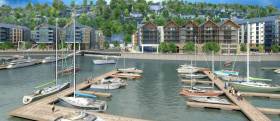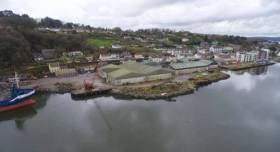Displaying items by tag: DSG
Doyle Shipping Group Apply to MARA for Operations & Maintenance Facility (OMF) at Greenore Port
Greenore Port, part of the Doyle Shipping Group (DSG) has announced that it is the first Irish Port to apply for a Maritime Area Consent (MAC) under the newly established Maritime Area Regulatory Authority (MARA), writes Jehan Ashmore.
As Afloat reported in July, MARA became the State’s first authority for issuing of maritime planning permissions. The new agency based in Co. Wexford was initiated by government ministers.
Greenore Port which is at the entrance to Carlingford Lough, is where DSG plan to invest €25m in a state-of-the-art operations and maintenance (OMF) base to support offshore wind on the East Coast. The project at the Co. Louth port is due to be completed in early 2026 and will create in excess of 200 jobs.
DSG which has its origins as a stevedore in Cork dating to 1886, is now a nationwide integrated shipping, logistics and maritime services group. In addition to expanding operations with working on wind energy projects of over 20 years.
It’s port operations at Greenore, handles general cargo, project cargo and a variety of commodities including bulk cargoes in animal feed, rock and fertiliser.
Greenore is also the main steel port in Ireland, and is strategically located close to the important Dublin-Belfast Economic Corridor, which is connected to the M1 motorway.
The port has completed an extensive dredging project to remove over 7000 tonnes of rock from the port’s harbour bed. This permits the port to accommodate merchant vessels of 60,000 deadweight tonnes (dwt) with a 8.5m draft and with ships of up to 200m length overall (LOA).
Cork Harbour: Upset As Passage West Docks Won’t Be Sold
#waterfrontproperty - People in Passage West, reports EchoLive.ie, have reacted with bitter disappointment to the announcement that the local dockyards are no longer to be sold to Cork County Council.
The Evening Echo revealed yesterday that the docks - the location for a major town centre regeneration proposal - has been taken off the market because of uncertainties surrounding Brexit.
The council had been granted €1.9m from the Government last November to buy the docks from the Doyle Shipping Group for a regeneration scheme that would see the docks become a modern waterfront settlement overlooking the harbour.
However, Brexit has led to the decision to take the site off the market, because it does not know what Ireland's future shipping needs will be.
Local Councillor Michael Frick Murphy said there is a lot of disappointment in the area and people feel the potential of Passage West is being thrown to the wayside.
For comments made by the councillor and more, click here.
Cork Harbour: Passage West Docks Sale Scuppered by Brexit
#waterfrontproperty - Plans in Cork Harbour, reports EchoLive.ie, to redevelop the dockyard in Passage West have been scuppered by Brexit.
The planned redevelopment of the dockyard site into a modern, urban waterfront settlement had been hailed as a ‘game-changer’ for the town when funding was secured to purchase the dockyard from the Doyle Shipping Group last November.
Cork County Council was granted €1.9m by the Government to purchase the eight-acre site but in a ‘bombshell’ announcement yesterday, County Hall chiefs said the site has been taken off the market and the funding would likely be lost.
Senior Executive Officer in County Hall, Jim Molloy, said the dockyard was no longer for sale because the uncertainty that Brexit has created for Ireland’s future shipping needs.
The announcement was described as a bitter blow for Passage West but Mr Molloy said a ‘wait and see’ approach is being adopted by shipping companies and ports until the implications of Brexit are known.
For more on the story click here.






























































